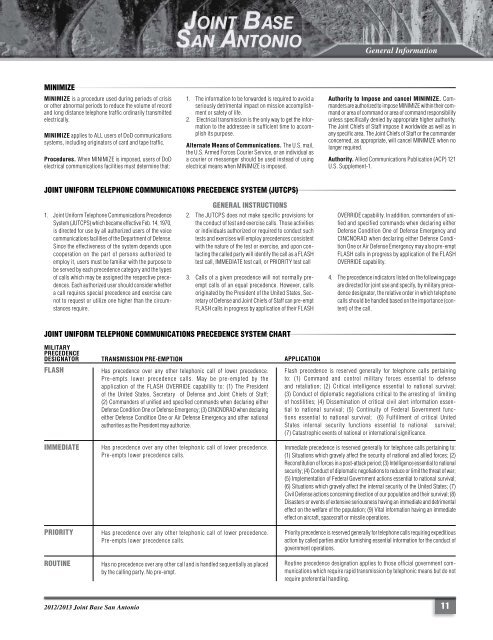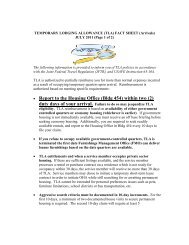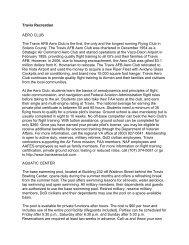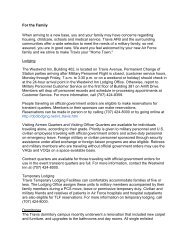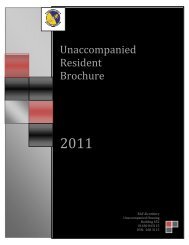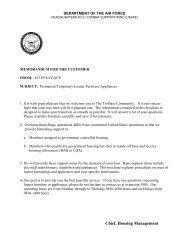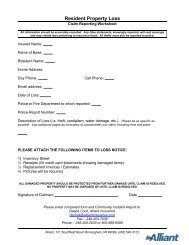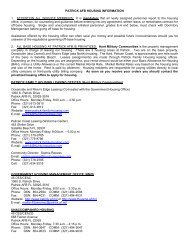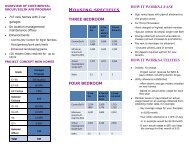San Antonio Military Telephone Directory - Air Force Housing
San Antonio Military Telephone Directory - Air Force Housing
San Antonio Military Telephone Directory - Air Force Housing
You also want an ePaper? Increase the reach of your titles
YUMPU automatically turns print PDFs into web optimized ePapers that Google loves.
General Information<br />
Minimize<br />
MINIMIZE is a procedure used during periods of crisis<br />
or other ab nor mal periods to reduce the volume of record<br />
and long distance tele phone traffic ordinarily transmitted<br />
electrically.<br />
minimiZE applies to ALL users of DoD com mu ni ca tions<br />
systems, in clud ing origi na tors of card and tape traffic.<br />
Procedures. When MINI MIZE is imposed, users of DoD<br />
electrical com mu ni ca tions facilities must determine that:<br />
1. The information to be forwarded is required to avoid a<br />
seriously det ri men tal im pact on mission accomplishment<br />
or safety of life.<br />
2. Electrical transmission is the only way to get the information<br />
to the ad dressee in sufficient time to ac complish<br />
its purpose.<br />
Alternate Means of Communications. The U.S. mail,<br />
the U.S. Armed <strong>Force</strong>s Courier Service, or an individual as<br />
a courier or messenger should be used instead of using<br />
electrical means when MINIMIZE is imposed.<br />
Authority to Impose and cancel MINIMIZE. Command<br />
ers are au thor ized to impose MINIMIZE within their command<br />
or area of com mand or area of com mand re spon si bil ity<br />
unless specifically denied by appropriate higher au thor ity.<br />
The Joint Chiefs of Staff impose it world wide as well as in<br />
any specific area. The Joint Chiefs of Staff or the commander<br />
con cerned, as appropriate, will cancel MINIMIZE when no<br />
longer required.<br />
Authority. Allied Communications Publication (ACP) 121<br />
U.S. Sup ple ment-1.<br />
Joint Uniform <strong>Telephone</strong> Communications Precedence System (JutcpS)<br />
1. Joint Uniform <strong>Telephone</strong> Communications Precedence<br />
System (JUTCPS) which became effective Feb. 14, 1970,<br />
is directed for use by all authorized users of the voice<br />
communications facilities of the Department of Defense.<br />
Since the effectiveness of the system depends upon<br />
cooperation on the part of persons authorized to<br />
employ it, users must be familiar with the purpose to<br />
be served by each precedence category and the types<br />
of calls which may be assigned the respective precedences.<br />
Each authorized user should consider whether<br />
a call requires special precedence and exercise care<br />
not to request or utilize one higher than the circumstances<br />
require.<br />
General Instructions<br />
2. The JUTCPS does not make specific provisions for<br />
the conduct of test and exercise calls. Those activities<br />
or individuals authorized or required to conduct such<br />
tests and exercises will employ precedences consistent<br />
with the nature of the test or exercise, and upon contacting<br />
the called party will identify the call as a FLASH<br />
test call, IMMEDIATE test call, or PRIORITY test call<br />
3. Calls of a given precedence will not normally preempt<br />
calls of an equal precedence. However, calls<br />
originated by the President of the United States, Secretary<br />
of Defense and Joint Chiefs of Staff can pre-empt<br />
FLASH calls in progress by application of their FLASH<br />
OVERRIDE capability. In addition, commanders of unified<br />
and specified commands when declaring either<br />
Defense Condition One of Defense Emergency and<br />
CINCNORAD when declaring either Defense Condition<br />
One or <strong>Air</strong> Defense Emergency may also pre-empt<br />
FLASH calls in progress by application of the FLASH<br />
OVERRIDE capability.<br />
4. The precedence indicators listed on the following page<br />
are directed for joint use and specify, by military precedence<br />
designator, the relative order in which telephone<br />
calls should be handled based on the importance (content)<br />
of the call.<br />
Joint Uniform <strong>Telephone</strong> Communications Precedence System Chart<br />
MILitarY<br />
PreceDence<br />
DesiGnator<br />
FLASH<br />
immEDIATE<br />
priority<br />
ROUTINE<br />
transmission Pre-emPtion<br />
Has precedence over any other telephonic call of lower precedence.<br />
Pre-empts lower precedence calls. May be pre-empted by the<br />
application of the FLASH OVERRIDE capability to: (1) The President<br />
of the United States, Secretary of Defense and Joint Chiefs of Staff;<br />
(2) Commanders of unified and specified commands when declaring either<br />
Defense Condition One or Defense Emergency; (3) CINCNORAD when declaring<br />
either Defense Condition One or <strong>Air</strong> Defense Emergency and other national<br />
authorities as the President may authorize.<br />
Has precedence over any other telephonic call of lower precedence.<br />
Pre-empts lower precedence calls.<br />
Has precedence over any other telephonic call of lower precedence.<br />
Pre-empts lower precedence calls.<br />
Has no precedence over any other call and is handled sequentially as placed<br />
by the calling party. No pre-empt.<br />
APPLication<br />
Flash precedence is reserved generally for telephone calls pertaining<br />
to: (1) Command and control military forces essential to defense<br />
and retaliation; (2) Critical intelligence essential to national survival;<br />
(3) Conduct of diplomatic negotiations critical to the arresting of limiting<br />
of hostilities; (4) Dissemination of critical civil alert information essential<br />
to national survival; (5) Continuity of Federal Government functions<br />
essential to national survival; (6) Fulfillment of critical United<br />
States internal security functions essential to national survival;<br />
(7) Catastrophic events of national or international significance.<br />
Immediate precedence is reserved generally for telephone calls pertaining to:<br />
(1) Situations which gravely affect the security of national and allied forces; (2)<br />
Reconstitution of forces in a post-attack period; (3) Intelligence essential to national<br />
security; (4) Conduct of diplomatic negotiations to reduce or limit the threat of war;<br />
(5) Implementation of Federal Government actions essential to national survival;<br />
(6) Situations which gravely affect the internal security of the United States; (7)<br />
Civil Defense actions concerning direction of our population and their survival; (8)<br />
Disasters or events of extensive seriousness having an immediate and detrimental<br />
effect on the welfare of the population; (9) Vital information having an immediate<br />
effect on aircraft, spacecraft or missile operations.<br />
Priority precedence is reserved generally for telephone calls requiring expeditious<br />
action by called parties and/or furnishing essential information for the conduct of<br />
government operations.<br />
Routine precedence designation applies to those official government communications<br />
which require rapid transmission by telephonic means but do not<br />
require preferential handling.<br />
2012/2013 Joint Base <strong>San</strong> <strong>Antonio</strong><br />
11


